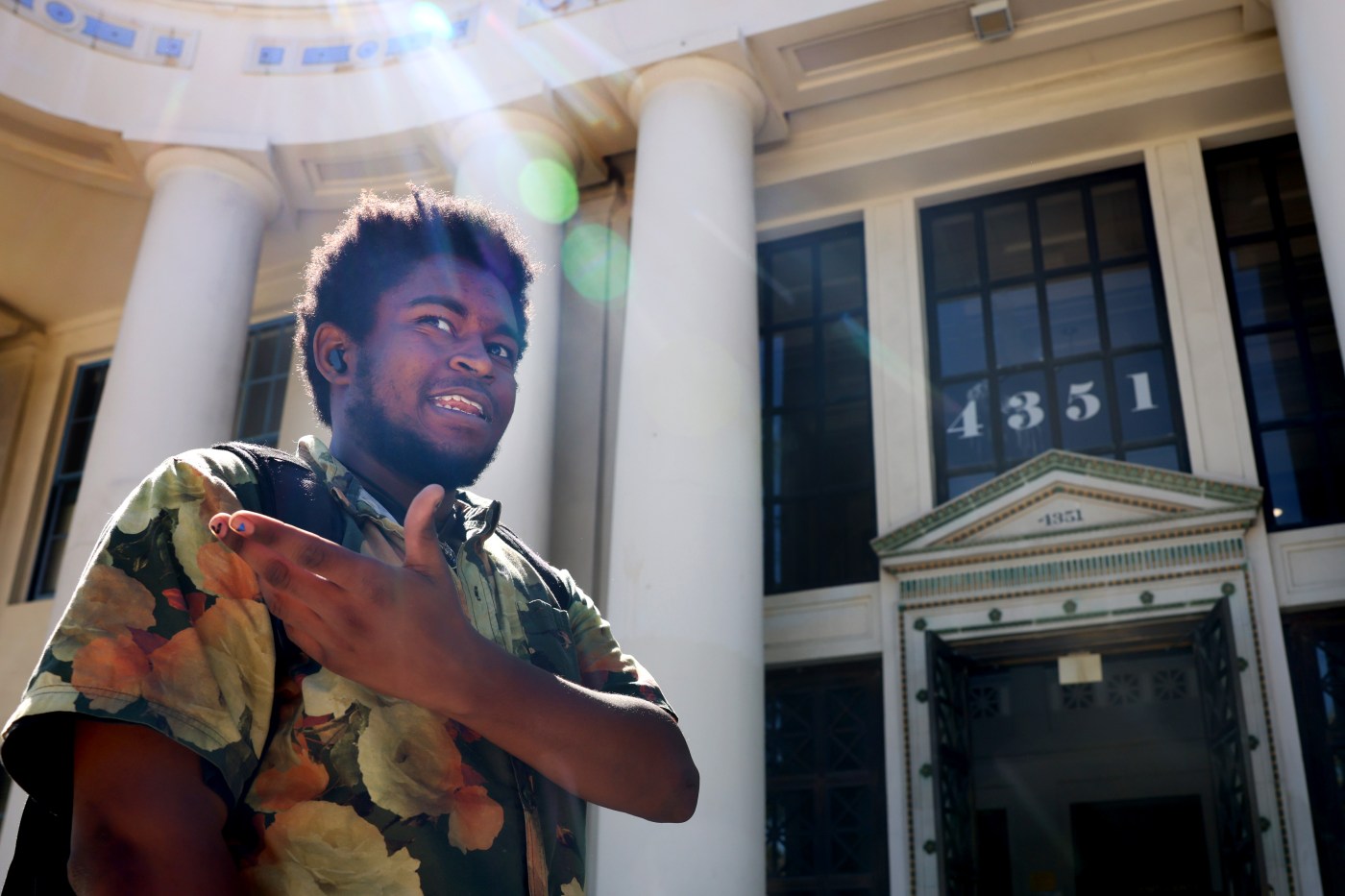OAKLAND — A precious few moments of stillness followed the ringing of the final bell Tuesday afternoon at Oakland Tech High School before a rush of chattering students rumbled through the front doors and into the real world.
Scrolling on smartphones that connect them to anyone and anything — including a ride home or another afterschool plan — the teenagers had little time to ponder their place in California’s history.
But in November, the 16- and 17-year-olds enrolled here, as well as in a smattering of other high schools in Oakland and Berkeley, will be the first ever in the state to vote in an election.
The question is: Do they care?
“Me, personally, I’m not that political, especially with today’s standards,” said Naseem Bennett, a 17-year-old Oakland Tech senior hanging out on the campus’ steps. “But would I vote? I would think about it.”
“My parents think I should vote,” said Xavier Montgomery, a sophomore at Oakland Tech, as he was unlocking his bicycle to ride home. “I’m not sure, though — still making up my mind.”
The minors’ ballots will be limited to races for seats on the cities’ school boards, which govern the policies and finances of local districts. The goal is to increase turnout.
School boards are not often the first public offices that voters worry about, whether it’s a student or parent or anyone else old enough to vote under the 26th Amendment to the U.S. Constitution, which in 1971 lowered the eligible age from 21 to 18.
But a large majority of Berkeley voters in 2016, followed by a similarly high number in Oakland four years later, decided that younger teenagers should help elect their representatives in the school districts. Albany followed suit this year.
“Oakland’s youth are at the forefront of movements regarding gun violence, environmental justice, and Black Lives Matter,” the Oakland ballot measure’s “pro” argument stated in 2020. “They need representation to advocate for themselves where it impacts them most: their education.”
Tsneem Alshalyan, 17, talks about the upcoming elections in which 16 and 17-year-olds will be able to vote for the first time ever in Oakland and Berkeley’s school board elections after getting off of classes at Oakland Tech High School in Oakland, Calif., on Tuesday, Aug. 13, 2024. (Ray Chavez/Bay Area News Group)
It took several years for the Alameda County Registrar of Voters to create a category in its digital systems for ballots that arrive by mail. But the oft-troubled office is finally ready to handle an influx of new voters.
“Logistically, that’s what made the most sense at this point,” Tim Dupuis, the registrar, said in an interview of the strictly vote-by-mail format.
A breakdown of votes cast by this group will be reflected in the county’s final election data. There are a number of races at stake.
Four of Oakland’s seven school board seats are up for election this year in voting districts that span the town’s geography, including Oakland Tech, McClymonds High, Fremont High and Castlemont High.
Berkeley, meanwhile, is not split into smaller voting districts; the entire city will vote on the five candidates running for two open school board seats in a single race.
Both cities may find that younger voters do care. The effort to lower voting ages elsewhere has often led to proportionately large turnout, including in Takoma Park, Maryland, which in 2013 allowed those 16 years and older to vote in any election, not just school boards.
Brattleboro, Vermont, did the same this year, though Newark, New Jersey, took a leaf from California’s playbook and began allowing younger teens to select school board leaders.
“It’s a pretty modest step. It’s not that radical,” said Steve Hill, an election expert with the advocacy group FairVote, of the East Bay’s school-board-only measures. “Young people are so much more informed than they ever were back then.”
Politics have increasingly found their way into schools, where students equipped with phones can read and share information outside the control of teachers and parents.
Asmara Larios Herrera,16, talks about the upcoming elections in which 16 and 17-year-olds will be able to vote for the first time ever in Oakland and Berkeley’s school board elections after getting off of classes at Oakland Tech High School in Oakland, Calif., on Tuesday, Aug. 13, 2024. (Ray Chavez/Bay Area News Group)
Related Articles
South Bay school district plans for solar panels, EV charging station generate concerns
Teen who opened fire at California high school, killing 2 and wounding a dozen more, up for parole
Despite new state law, Southern California school district adopts gender parental-notification policy
First new public high school in Alameda County in more than 50 years opens
Judge approves six-figure settlement in case of California special-needs student’s broken arm
Many high-school seniors today were preteens when the question of reopening campuses during the COVID-19 pandemic became one of the country’s most heated debates, often pitting teachers unions against parents and thrusting even smaller school boards into public scrutiny.
And beyond mainstream issues where liberal East Bay families find common ground, there are more uncomfortable questions, such as whether school boards should join calls for a ceasefire to violence in Gaza — a debate that has previously led local public meetings to descend into chaos.
“If there’s a resolution supporting Palestinians, I think students will want to know who we should vote for that would support it,” said Khadija G., a 17-year-old senior at Oakland Tech who requested that her full last name not be published.
Tsneem Alshalyan, another 17-year-old senior, also raised the Gaza issue as one of importance, noting that her friends’ group took part in several pro-Palestinian protests this year in San Francisco.
Other concerns Alshalyan shared were broader: In campus restrooms, she said, menstrual products are frequently in short supply.
More than one student interviewed felt more interested in Oakland’s District 1 school board election upon hearing the seat, which represents areas to the city’s north, is an open race.
Incumbent Sam Davis decided against running this year, in part, he said, because of the calamity that followed his vote in 2022 to close several schools in Oakland — a board decision that prompted widespread protests, including by students, and was later reversed.
Turnout among students this November may ultimately be low, Davis speculated, but the process could also raise students interest in local government. And it may force some elected officials to start listening to them.
“On a national scale, you have so many (politicians) across the country trying to put up barriers to voting,” Davis said. “In Oakland, we’re doing the opposite.”
Staff writer Sierra Lopez contributed reporting to this story.
Shomik Mukherjee is a reporter covering Oakland. Call or text him at 510-905-5495 or email him at shomik@bayareanewsgroup.com.












